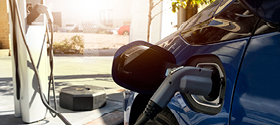NYS Guide to Inflation Reduction Act Savings

Save Money on Clean Energy Upgrades to Your Home, Business, or Vehicle
New York residents and businesses are now eligible for energy-related savings through the Inflation Reduction Act (IRA) which was passed by the federal government in 2022. The IRA will provide $370 billion in funding for clean energy and environmental justice initiatives nationwide, representing the largest investment in climate action by the U.S. government.
A significant portion of IRA funding includes tax credits and rebates for residents (homeowners and renters) and businesses to make energy efficiency upgrades to their homes or buildings, or purchase clean energy equipment like solar panels, electric vehicles (EVs), and heat pumps.
IRA incentives are set to be offered through 2032, providing ample time and opportunity for New Yorkers to plan for and take advantage of IRA savings to make the switch to EVs, heat pumps, and other low-carbon technologies. Often, IRA incentives can be combined with New York State tax credits or rebates to maximize savings.
This guide will unpack how IRA incentives work, introduce eligible clean energy technologies, and provide tips for making the most of IRA savings for your home or business.
Understanding IRA Incentives: Tax Credit vs. Rebate
IRA incentives are designed to save consumers money on appliances, equipment, and services that save energy and cut greenhouse gas emissions. It’s important to note that rebates and tax credits work differently, with rebates providing more upfront savings and tax credits lowering the amount of tax you owe on future tax return(s).
Tax Credits
According to the Internal Revenue Service (IRS), tax credits can reduce the amount of tax you owe or increase your tax refund. IRA tax credits provide a dollar-for-dollar reduction in the amount of Federal income tax you would otherwise owe.
Tax credits are claimed on your annual tax return for the tax year the purchase was made. IRA tax credits became available on January 1, 2023, meaning New Yorkers can claim credits on eligible purchases this year and moving forward through 2032.
Rebates
Whereas tax credits provide savings on the amount of tax you owe, rebates provide an upfront discount that’s credited or returned to a customer at the point-of-sale or shortly after the transaction. New York State is in the process of rolling out IRA rebates, with initial funding currently available for income-eligible New Yorkers through the EmPower+ program.
NYSERDA will continue updating this guide and other IRA resources when additional IRA rebates are announced.
IRA-Eligible Home Improvements
Completing a no-cost energy assessment can pinpoint where your home is wasting energy to help determine where your home improvement dollars would be best spent.
New York homeowners can use IRA tax credits to reduce the cost of home energy efficiency improvements, energy-saving renovations, and installing efficient heating and cooling systems.
The IRA enhanced the existing Energy Efficient Home Improvement Credit ![]() , allowing homeowners to claim 30% of the costs on eligible improvements instead of 10%. From 2023 through 2032, New Yorkers can claim up to $3,200 in efficiency tax credits a year for eligible purchases, including:
, allowing homeowners to claim 30% of the costs on eligible improvements instead of 10%. From 2023 through 2032, New Yorkers can claim up to $3,200 in efficiency tax credits a year for eligible purchases, including:
- Up to $1,200 for home envelope improvements, including efficient windows, exterior doors, insulation, and electrical panel upgrades.
- Up to $2,000 for air source heat pumps
 , heat pump water heaters
, heat pump water heaters  , and biomass stoves/boilers.
, and biomass stoves/boilers.
These home improvements represent cost-effective ways to reduce energy use, improve comfort, and save money. Many of these upgrades are also eligible for New York State incentives, helping homeowners get back some hard-earned cash for other home purchases.
For example, cold-climate air source heat pumps, which provide both home heating and cooling, are eligible for rebates through NYS Clean Heat ![]() . Savings on these efficient, emission-free systems average $2,000-$3,000 for whole-home solutions and $100-$400 for partial solutions.
. Savings on these efficient, emission-free systems average $2,000-$3,000 for whole-home solutions and $100-$400 for partial solutions.
NYS Clean Heat also provides rebates for ground source heat pumps, which are eligible for a 30% IRA tax credit and 25% New York State income tax credit. Heat pump systems are being installed more frequently across New York and the U.S., with national heat pump sales surpassing gas furnaces in 2022.
IRA Savings on Solar and Energy Storage
See how solar is powering New York and how you can benefit too.
Installing solar panels with a battery storage system allows homeowners and businesses to store excess clean energy generated during the day for use at night, when peak demand charges are highest, or during a power outage.
New Yorkers who invest in solar or battery storage for their home may qualify for the Residential Clean Energy Credit ![]() , which equals 30% of the cost for projects installed between 2022-2032. There’s no annual or lifetime limit on the tax credit.
, which equals 30% of the cost for projects installed between 2022-2032. There’s no annual or lifetime limit on the tax credit.
On top of the IRA tax credit for solar, New York residents can claim a State income tax credit equal to 25% of the project cost, up to $5,000, and leverage other residential solar incentives and financing to reduce the upfront cost.
Prior to the IRA, battery storage systems were only eligible if they were fully charged by onsite solar panels. Now, New Yorkers can access the 30% tax credit for energy storage systems with a capacity of 3 kilowatt hours or more, whether their energy comes from community solar or rooftop panels. Additional incentives are available for Long Island residents to pair solar and energy storage at home.
Businesses can access IRA tax credits to go solar, too. Tax credits can cover up to 70% of the project cost depending on labor requirements, location, and if the project serves low-income customers. See our IRA for businesses page for a breakdown of the requirements.
IRA-Eligible Electric Vehicles
The IRA helps New York residents and businesses replace their gas-powered vehicles for an electric vehicle (EV), with a growing list of eligible models ![]() to choose from. Combined, the IRA tax credit and New York’s Drive Clean Rebate can save New York residents up to $9,500 on a selection of new EV models.
to choose from. Combined, the IRA tax credit and New York’s Drive Clean Rebate can save New York residents up to $9,500 on a selection of new EV models.
The total tax credit for EVs varies by vehicle manufacturer and model, vehicle weight, whether it’s new or used, and other factors. As of 2024, buyers can transfer the IRA tax credit to a car dealership to receive a point-of-sale discount equivalent to the tax credit amount on eligible new and used EVs.
A New York family shares their experience owning an EV and taking a 700-mile road trip.
Personal Vehicles
- New Electric Vehicles: Up to $7,500 based on battery component and mineral sourcing
- Used Electric Vehicles: 30 percent of sale price up to $4,000
EV home chargers are also eligible for IRA tax credits, though eligibility requirements have yet to be finalized.
Commercial Vehicles
- Plug-in Hybrid Electric Vehicles: Up to 15% of cost
- Battery-Electric or Fuel Cell Electric Vehicles: Up to 30% of cost
IRA tax credits for commercial vehicles may not exceed $7,500 for EVs under 14,000 lbs. and $40,000 for vehicles above $14,000 lbs.
Learn More About IRA Savings and Eligible Purchases
-

-

-

Businesses
Read More BusinessesSee how businesses can use clean energy to improve their bottom line.
-

Vehicles
Read More VehiclesExplore ways to save on a new or used electric vehicle and home charger.
Sign Up For News
Stay up to date on energy-saving programs and incentives, best practices, and more.
Stay Connected